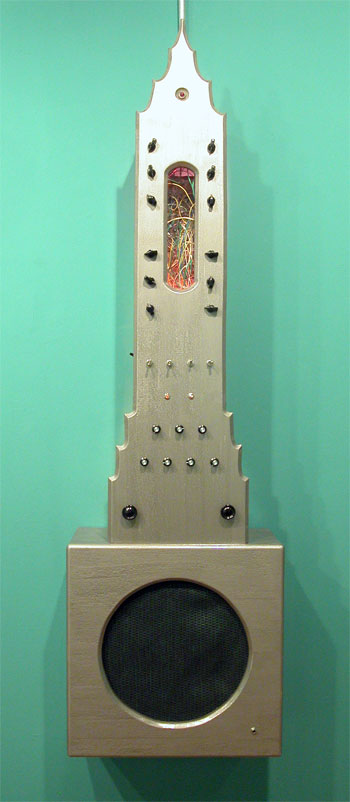Linda: Do you each have specialties in playing the instruments?
Brian: Well, only because one of us may have logged more time with an instrument, so we might know our way around a little bit more. There's a lot of figuring out what to do along the way when we make the music, because we are responding to what's going on with the instrument.
Leon: Onstage, we actually are experimenting; we're not sure what's going to happen.

The Sepulchre (Wall Gin)
Brian: Yes, we're mostly busy onstage trying to prevent bad things from happening and encouraging good things to happen.
Leon: It's like being a manager: you try to facilitate communication and entertaining dialogue.
Brian: And it is a dialogue. There's all this ricocheting back and forth as we go along.
Linda: You both are accomplished performers and composers on more conventional instruments. How does it feel to be doing what you are doing now? And how do fans of your other projects feel about it?
Leon: Since escaping from guitar prison, after The Happiest Guys stopped gigging in 2001, I just enjoy doing other sorts of music that I never could have imagined doing, or never even knew about! I haven't noticed any major "why the fuck are you wasting your time on this crap?" sentiment from Happiest Guys fans, although they are an unusually polite collection of individuals.
In terms of the music biz, Dewanatron has been different than playing in normal bands where we were always out trying to get gigs and sending out demos and schmoozing with people. Since we started doing Dewanatron, we haven’t actually had to try to get gigs; the gigs just sort of find us. People tell other people what we’re up to. It was like we finally started to get smart: We built these instruments and they play the music for us, and they do the promotion.
Linda: It's like your instruments are charting a new course for you.
Leon: Yeah... What we’re doing with our Dewanatrons is both new and also much more related to the experimentation they were doing with prototypical analog synthesizers and other machines back in the '40s, '50s, and '60s, than it is related to the digital audio that most people are exploring at the moment. In fact, everything I've built them with, the technology was pretty much available by 1969 or '70. We don't use any microprocessors, or any sorts of wave tables or any modern digital methods of generating sounds. I do use flip-flop digital circuits because I have to be able to count, but they are very primitive digital devices.
Linda: And you are gaining something unique by using this old technology, rather than a modern laptop. It’s more than just sentimentalism.
Leon: Oh, yes, we gain a lot. When you make music on laptops, you're doing something very different. You're using these digital models of the world – be it a digital model of an acoustic or electronic instrument – where the sounds you can get out of it are essentially limited by the imagination of the software programmer. Whereas, the sounds you get out of analog electronic instruments or acoustic instruments are limited only by the laws of nature. I think there's a lot more variety in that. For instance, when I'm playing instruments that are analog, there are certain things that will just never repeat again because this thing has a character all its own. It's a physical system. It's not just an imaginary, virtual system.
And I like the fact that an analog circuit is really just another way to get matter to respond to the forces of nature. Like a guitar string, when you pluck it, you have this bit of matter, and you're putting a force on it, letting it go, and it's operating according to the laws of nature. It's going back and forth, oscillating, making this wooden thing oscillate and then you have matter resonating, giving you this unique sound with characteristics unique to whoever is doing it. In a similar way, in analog music circuitry, you're still plucking matter and getting it to vibrate. But it's just not all the matter. Instead of plucking the whole guitar string, you're taking the electrons inside of a conductor and plucking those. But it's still matter that's moving back and forth in the oscillator according to the laws of nature. It has its momentum; it has the forces opposing its motion. As Brian likes to describe it, we set up gymnasiums that electrons kind of fling around in. That's sort of how we're making sounds.


